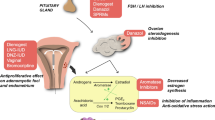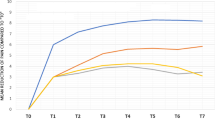Abstract
Purpose
Previous studies have indicated an increased risk of gallbladder disease with hormonal contraceptives although with discordant results. The potential increased risk of gallbladder disease with hormonal contraceptives is concerning given that women are at increased risk of this disease. Thus, the aim of this study was to examine risk of surgery-confirmed gallbladder disease (cholecystectomy) with oral contraceptives, intrauterine devices, and injectable hormonal contraceptives.
Methods
We conducted a retrospective cohort study. Females aged 15–45 who initiated hormonal contraceptive use were identified in the United States IQVIA Ambulatory electronic medical record database between 2008 and 2018. Cox proportional hazards models were used to estimate adjusted hazards ratios and 95% confidence intervals for cholecystectomy with eight formulations of contraceptives compared with levonorgestrel and ethinyl estradiol combined oral contraceptive. Sensitivity analysis was conducted by lagging exposure by 90 days and by excluding patients with history of gallbladder disease. Secondary analyses were conducted by cumulative duration of use.
Results
We identified 1,425,821 females who initiated the use of hormonal contraceptives and generated 4417 cholecystectomy events. Overall, the use of medroxyprogesterone acetate (HR: 1.22, 95% CI: 1.07–1.40) and at least 1 year of levonorgestrel intrauterine device use (HR: 1.74: 95% CI: 1.19–2.54) were associated with increased risk of cholecystectomy when compared with levonorgestrel and ethinyl estradiol combined oral contraceptive. However, we did not observe an increased risk with other hormonal contraceptives. Consistent results were observed across sensitivity analyses.
Conclusion
In this large population-based study, there was an increased risk of cholecystectomy with medroxyprogesterone acetate and intrauterine device but not other hormonal contraceptives. Additional large observational studies are required to corroborate these findings.
Similar content being viewed by others
Data availability
The data that support the findings of this study are available from IQVIA. Restrictions apply to the availability of these data, which were used under license for this study.
Code availability
The codes generated for the current study are available from the corresponding author upon reasonable request.
References
United Nations; Department of Economic and Social Affairs; Population Division (2015) Trends in contraceptive use worldwide. https://www.un.org/development/desa/pd/sites/www.un.org.development.desa.pd/files/undesa_pd_report_2015_trends_contraceptive_use.pdf. Accessed 1 Nov 2020
United Nations; Department of Economic and Social Affairs (2019) Contraceptive use by method. https://www.un.org/development/desa/pd/sites/www.un.org.development.desa.pd/files/files/documents/2020/Jan/un_2019_contraceptiveusebymethod_databooklet.pdf. Accessed 1 Nov 2020
Moorman PG, Havrilesky LJ, Gierisch JM, Coeytaux RR, Lowery WJ, Peragallo Urrutia R, Dinan M, McBroom AJ, Hasselblad V, Sanders GD, Myers ER (2013) Oral contraceptives and risk of ovarian cancer and breast cancer among high-risk women: a systematic review and meta-analysis. J Clin Oncol 31(33):4188–4198. https://doi.org/10.1200/JCO.2013.48.9021
Morch LS, Skovlund CW, Hannaford PC, Iversen L, Fielding S, Lidegaard O (2017) Contemporary hormonal contraception and the risk of breast cancer. N Engl J Med 377(23):2228–2239. https://doi.org/10.1056/NEJMoa1700732
Roach RE, Helmerhorst FM, Lijfering WM, Stijnen T, Algra A, Dekkers OM (2015) Combined oral contraceptives: the risk of myocardial infarction and ischemic stroke. Cochrane Database Syst Rev (8): CD011054 https://doi.org/10.1002/14651858.CD011054.pub2
Thijs C, Knipschild P (1993) Oral contraceptives and the risk of gallbladder disease: a meta-analysis. Am J Public Health 83(8):1113–1120. https://doi.org/10.2105/ajph.83.8.1113
Wang S, Wang Y, Xu J, Chen Y (2017) Is the oral contraceptive or hormone replacement therapy a risk factor for cholelithiasis: a systematic review and meta-analysis. Medicine (Baltimore) 96(14):e6556. https://doi.org/10.1097/MD.0000000000006556
Sun H, Tang H, Jiang S, Zeng L, Chen EQ, Zhou TY, Wang YJ (2009) Gender and metabolic differences of gallstone diseases. World J Gastroenterol 15(15):1886–1891. https://doi.org/10.3748/wjg.15.1886
Figueiredo JC, Haiman C, Porcel J, Buxbaum J, Stram D, Tambe N, Cozen W, Wilkens L, Le Marchand L, Setiawan VW (2017) Sex and ethnic/racial-specific risk factors for gallbladder disease. BMC Gastroenterol 17(1):153. https://doi.org/10.1186/s12876-017-0678-6
US EMR - IQVIA Ambulatory EMR. https://www.iqvia.com/library/fact-sheets/us-only-iqvia-ambulatory-emr. Accessed 1 Sept 2020
Lund JL, Richardson DB, Sturmer T (2015) The active comparator, new user study design in pharmacoepidemiology: historical foundations and contemporary application. Curr Epidemiol Rep 2(4):221–228. https://doi.org/10.1007/s40471-015-0053-5
Jick S, Pennap D (2012) Drospirenone- and levonorgestrel-containing oral contraceptives and the risk of gallbladder disease. Contraception 86(3):220–223. https://doi.org/10.1016/j.contraception.2012.01.006
Etminan M, Delaney JA, Bressler B, Brophy JM (2011) Oral contraceptives and the risk of gallbladder disease: a comparative safety study. CMAJ 183(8):899–904. https://doi.org/10.1503/cmaj.110161
Tierney S, Nakeeb A, Wong O, Lipsett PA, Sostre S, Pitt HA, Lillemoe KD (1999) Progesterone alters biliary flow dynamics. Ann Surg 229(2):205–209. https://doi.org/10.1097/00000658-199902000-00007
Shaffer EA, Taylor PJ, Logan K, Gadomski S, Corenblum B (1984) The effect of a progestin on gallbladder function in young women. Am J Obstet Gynecol 148(5):504–507. https://doi.org/10.1016/0002-9378(84)90735-x
US Food and Drug Administration Agency (2016) DEPO-PROVERA CI (medroxyprogesterone acetate) injectable suspension, for intramuscular use. https://www.accessdata.fda.gov/drugsatfda_docs/label/2016/020246s058lbl.pdf. Accessed 15 Nov 2020
Jiang Y, Tian W (2017) The effects of progesterones on blood lipids in hormone replacement therapy. Lipids Health Dis 16(1):219. https://doi.org/10.1186/s12944-017-0612-5
Fahmy K, Khairy M, Allam G, Gobran F, Alloush M (1991) Effect of depo-medroxyprogesterone acetate on coagulation factors and serum lipids in Egyptian women. Contraception 44(4):431–444. https://doi.org/10.1016/0010-7824(91)90033-c
Hayat S, Hassan Z, Changazi SH, Zahra A, Noman M, Zain Ul Abdin M, Javed H, Ans AH (2019) Comparative analysis of serum lipid profiles in patients with and without gallstones: a prospective cross-sectional study. Ann Med Surg (Lond) 42:11–13. https://doi.org/10.1016/j.amsu.2019.04.003
Funding
This study was supported by a project grant from Canadian Institutes of Health Research.
Author information
Authors and Affiliations
Contributions
ME is the guarantor of this study. ME and FK conceptualized the research question and study design. ME was involved in acquisition of data. All authors were involved in data interpretation. FK and ME drafted the manuscript, while all others were involved in the critical revision of the manuscript for important intellectual content. Statistical analysis was conducted by FK and ME. ME obtained the funding and was the study supervisor. FK and ME provided technical and material support.
Corresponding author
Ethics declarations
Ethics approval
This is an observational study. The University of British Columbia Research Ethics Committee has confirmed that no ethical approval is required.
Competing interests
The authors declare no competing interests.
Supplementary information
Below is the link to the electronic supplementary material.
Rights and permissions
About this article
Cite this article
Khosrow-Khavar, F., Sodhi, M., Ganjizadeh-Zavareh, S. et al. Association between the use of hormonal contraceptives and risk of cholecystectomy in women of reproductive age. Eur J Clin Pharmacol 77, 1523–1529 (2021). https://doi.org/10.1007/s00228-021-03137-6
Received:
Accepted:
Published:
Issue Date:
DOI: https://doi.org/10.1007/s00228-021-03137-6




